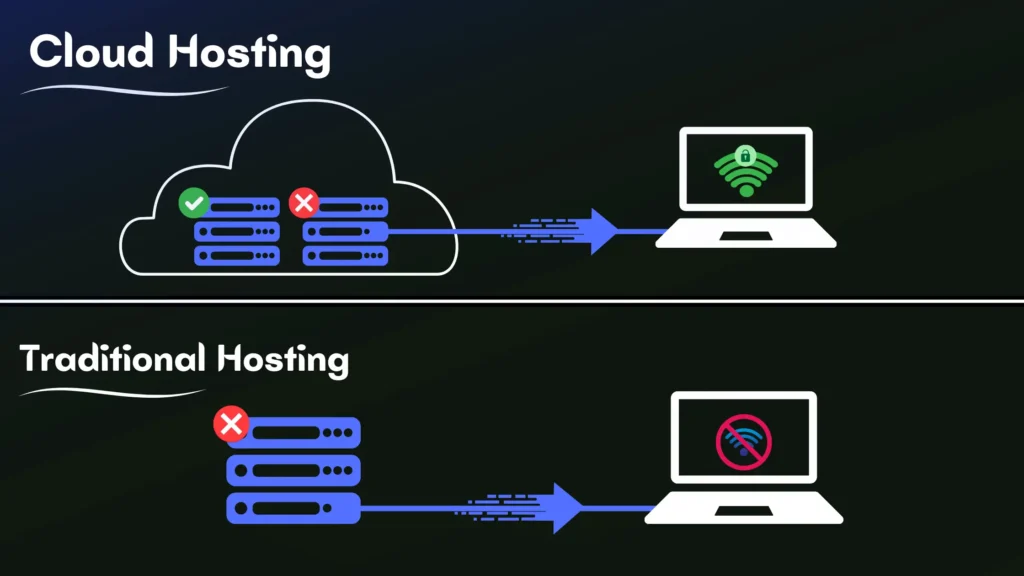
In the digital age, website hosting stands as a crucial pillar for businesses and individuals. It’s the backbone that delivers your website to anyone who wants to visit or engage with your content.
Numerous types of website hosting exist, from shared hosting, where multiple sites are hosted on a single server, to dedicated hosting, which provides an entire server for a single website, ensuring optimal performance and security.
Among various hosting options, cloud hosting stands out as one of the best solutions. It utilizes multiple servers to host your website, distributing data across different locations.
In this article, we will clearly explain what cloud hosting is all about. We aim to provide a comprehensive view to help you determine if it is the right choice for your business or not.
What is Cloud Hosting?
Cloud hosting is a type of web hosting service that utilizes multiple servers to distribute resources and handle incoming traffic. This means that your website is not hosted on a single physical server, but rather on a network of servers connected through the internet. This arrangement allows for better utilization of resources to give high performance and reduces the risk of downtime.
How Does Cloud Hosting Work?

Cloud Hosting utilizes virtualization technology to distribute your website’s resources across multiple servers, ensuring a well-balanced load, optimal performance, and seamless scalability. When visitors access your website, the cloud network dynamically allocates resources from a server pool, preventing any server overload.
In contrast, traditional website hosting relies on a single server to handle all traffic, which can result in performance issues and downtime during peak periods of high traffic.
However, with cloud hosting, redundancy is a big advantage. If one server has a problem, another server steps in smoothly, so your website keeps running without any interruptions. It gives businesses a reliable and flexible solution for consistent website performance, even when there’s a sudden increase in web traffic.
What are the benefits of Cloud Hosting?
It also enhances the performance and reliability of your website by offering numerous benefits. Now, let’s explore its key advantages.
Who Should Use Cloud Hosting?
Cloud website hosting is beneficial for various users:
(1) Small businesses or start-ups: It offers easy scalability which means businesses can start with minimal resources and effortlessly expand as their business grows. This flexibility ensures that they can meet the increasing demands of their growing customer base without any disruption.
(2) Medium to large enterprises: It provides enterprises with a reliable infrastructure and guaranteed uptime to ensure their websites are accessible and running smoothly. This reliability ensures that they can deliver an uninterrupted online experience to their customers, building trust and loyalty.
(3) Bloggers and content creators: Managed cloud hosting simplifies the process, so bloggers and content creators can focus on creating valuable content. With user-friendly interfaces and intuitive features, managing websites becomes effortless, even without extensive technical knowledge.
(4) Developers and tech companies: It also provides developers and tech companies with advanced features and unparalleled flexibility. They can customize their hosting environment to meet their specific requirements, enabling them to optimize performance, security, and scalability according to their unique needs.
Managed vs Unmanaged Cloud Hosting
When it comes to cloud hosting solutions, there are two primary choices that you can choose from: managed hosting and unmanaged hosting. Let’s explore the differences between them.
Managed Cloud Hosting
In Managed Cloud Hosting, the service provider takes care of all the technicalities. They handle everything from server maintenance and security updates to installing software and troubleshooting issues. This option is ideal if you lack technical expertise or prefer to focus on your business rather than managing server operations. The downside is that it comes at a higher cost.
Advantages
Disadvantages
Unmanaged Cloud Hosting
It is a more hands-on approach. The hosting provider only takes care of the physical server and network availability. You are responsible for tasks like software installation, security monitoring, and data backups. This option is cheaper and provides full control over your server environment but requires a high level of technical knowledge.
Advantages
Disadvantages
Frequently Asked Questions
Is cloud hosting suitable for my website?
Yes, cloud hosting is a good choice for your website if you expect changes in traffic and want a reliable option. However, consider factors like your budget and technical skills to make sure it’s the right fit for you.
Can I switch from traditional hosting to cloud hosting?
Yes, you can easily migrate your website from traditional to cloud hosting without downtime or interruptions. Most cloud hosting providers offer seamless migration services or provide detailed guidelines for manual migration.
Is cloud hosting more expensive than traditional hosting?
While the initial costs of cloud hosting may seem higher than traditional hosting, it’s important to consider the long-term benefits. Cloud hosting offers a pay-as-you-go model, allowing you to only pay for the resources you use. Over time, this can save you more money compared to traditional hosting, where you pay a fixed rate regardless of the resources used.
Do I need technical expertise to use cloud hosting?
While it can be beneficial, you don’t necessarily need technical expertise to use cloud hosting. Many providers offer managed cloud hosting services, where they handle all the technical aspects, including setup, management, and maintenance. This allows you to focus on running your business while they take care of your website’s hosting needs.
How secure is cloud hosting?
Cloud hosting is generally very secure. Many providers offer advanced security features, including end-to-end encryption, firewall protection, DDoS protection, intrusion detection, and regular security updates. However, It’s important to do your own research and make sure your provider follows the best security practices.
How does cloud hosting different from traditional hosting?
Traditional hosting relies on a single server to manage all website resources and traffic, while cloud hosting utilizes a network of servers that work together to distribute resources and handle traffic, providing better performance and reliability.

